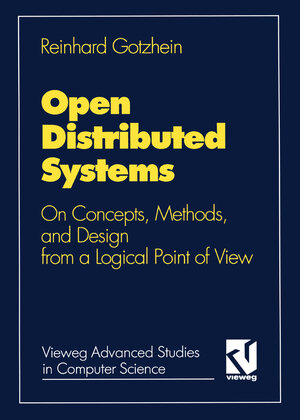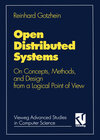
×
![Buchcover ISBN 9783528053581]()
Open Distributed Systems
On Concepts, Methods, and Design from a Logical Point of View
von Reinhard GotzheinInhaltsverzeichnis
- 0 Introduction.
- 0.1 Key topics of open distributed systems design.
- 0.2 The role of standards.
- 0.3 The need for formal descriptions.
- 0.4 Distributed systems from the point of view of DAI.
- 1 Formal methods in the system design process.
- 1.1 A model for the system design process.
- 1.2 Requirements for formal description techniques.
- 1.3 Synthesis and analysis activities.
- 2 Requirement specification of open distributed systems.
- 2.1 Basic architectural concepts.
- 2.2 System architectures.
- 2.3 Refinement and abstraction.
- 2.4 The Basic Reference Model of Open Systems Interconnection.
- 2.5 Basic concepts of formal description techniques.
- 2.6 Some remarks.
- 3 The design of a temporal logic for open distributed systems.
- 3.1 Some requirements on expressiveness.
- 3.2 A survey of temporal logics.
- 3.3 A modular temporal logic for open distributed systems.
- 4 The interaction point concept.
- 4.1 The role of interaction points.
- 4.2 A list of possible interaction point properties.
- 4.3 Formal specification of interaction point properties.
- 4.4 Formal reasoning about interaction points.
- 4.5 Interaction point representations in operational FDTs.
- 4.6 Conformance between abstraction levels via the interaction point concept.
- 5 Communication services.
- 5.1 The service concept.
- 5.2 Design methodology.
- 5.3 Example “modified InRes service”.
- 5.4 Conclusion.
- 6 An epistemic logic for open distributed systems.
- 6.1 The role of knowledge.
- 6.2 Notions of knowledge.
- 6.3 A modular epistemic logic for open distributed systems.
- 7 Applying temporal epistemic logics to open distributed systems.
- 7.1 Example “mutual exclusion”.
- 7.2 Example “drink server”.
- 8 Conclusion.
- References.
- A.1 Theorems and valid formulas.
- A.2 Ordering properties for the service provider.
- A.3Abbreviations.
- A.4 Notation.



